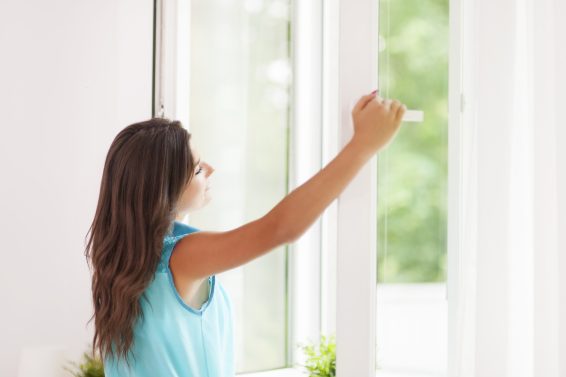by Ingrid Justick:
Vol. 25, No. 5

Toxic elements and energy-inefficient practices within our own homes negatively impact not only the health of our bodies, but of the earth, too. A few simple, inexpensive changes can make a significant difference in the well-being of our planet and our homes.
Since we spend almost 90% of our time indoors, breathing easy can be a matter of concern. Indoor levels of many pollutants are 25 to 100 times higher than those outdoors. In our indoor air, we find pet-dander, pollen, and chemicals from pesticides, cleaning products, paints, treated carpets and wood, that cause allergies, asthma and neurological damage. Making a few basic adjustments can clear the air considerably:
• Open your windows for at least 10 minutes every day.
• If your water is so heavily chlorinated that you can smell the chlorine, open your bathroom window or turn on the exhaust fan whenever you are taking a shower. Airborne chlorine is a potential carcinogen at high levels.
• Ventilate when using gas or wood-burning stoves or fireplaces, which produce harmful gasses (including carbon-monoxide.)
• Run your kitchen exhaust fan (it should ventilate to the outside) when using your gas appliances.
• Vacuum at least twice a week using a unit with a high-efficient-particulate air filter to eliminate dust and all those contaminants that accumulate in it.
• Use green housecleaning practices. Many indoor pollutants come from household cleaning products. So please use environmentally friendly cleaning alternatives.
• For clothes that need dry cleaning, find a wet cleaner. Many dry cleaners use perchloethylene, a chemical shown to cause cancer in animals. If you cannot find a natural wet or green cleaner, remove the plastic bag from your traditionally treated garment and hang it outdoors for a few hours, before hanging it in a closet.
• Avoid gas-emitting products, including paints, sealants, furniture made from pressed wood and wall-to-wall carpeting made with products containing formaldehyde. This toxic chemical off-gasses into the air. Open windows when applying paint or sealers. If this is not possible, place a bowl filled with white vinegar in the center of the room to absorb the toxins.
• Avoid commercial air fresheners, which can release chemical toxins and airway irritants, such as dichlorobenzenes and xylene. Instead, use natural air fresheners like Ecco Mist, available at health food stores. Their Lavender Mist removes smoke, cooking and pet odors. Sprayed on your bed linens at night, it relaxes and soothes your emotions. It also is known to combat germs and boost immunity. It is used to disinfect hospitals.
• Grow indoor plants. Plants are not only nature’s air filters, but this connection to nature can have other health benefits, like improving moods and lowering stress levels.
Please establish living patterns that benefit and sustain all elements of life.
For environmentally friendly information call: 732-922-2935







